Law 11 Assignment: Contract Law, Directors' Duties, and Corporate Law
VerifiedAdded on 2020/04/07
|11
|2709
|36
Homework Assignment
AI Summary
This law assignment addresses two key legal issues. The first part analyzes whether contracts signed by an individual on behalf of a company bind the company, focusing on the doctrine of indoor management and its exceptions. It examines a scenario where a company's constitution limits the authority of individuals to sign contracts and concludes that contracts are enforceable based on the application of the indoor management rule. The second part explores the statutory and equitable duties of company directors, particularly focusing on shadow directors and their responsibilities. It examines directors' duties to exercise due care and diligence and to act in good faith, referencing relevant sections of the Corporations Act 2001 and case law. The assignment concludes that directors of a parent company can be considered shadow directors of a subsidiary and are thus subject to these duties.

Running Head: Law 1
Law
Law
Paraphrase This Document
Need a fresh take? Get an instant paraphrase of this document with our AI Paraphraser
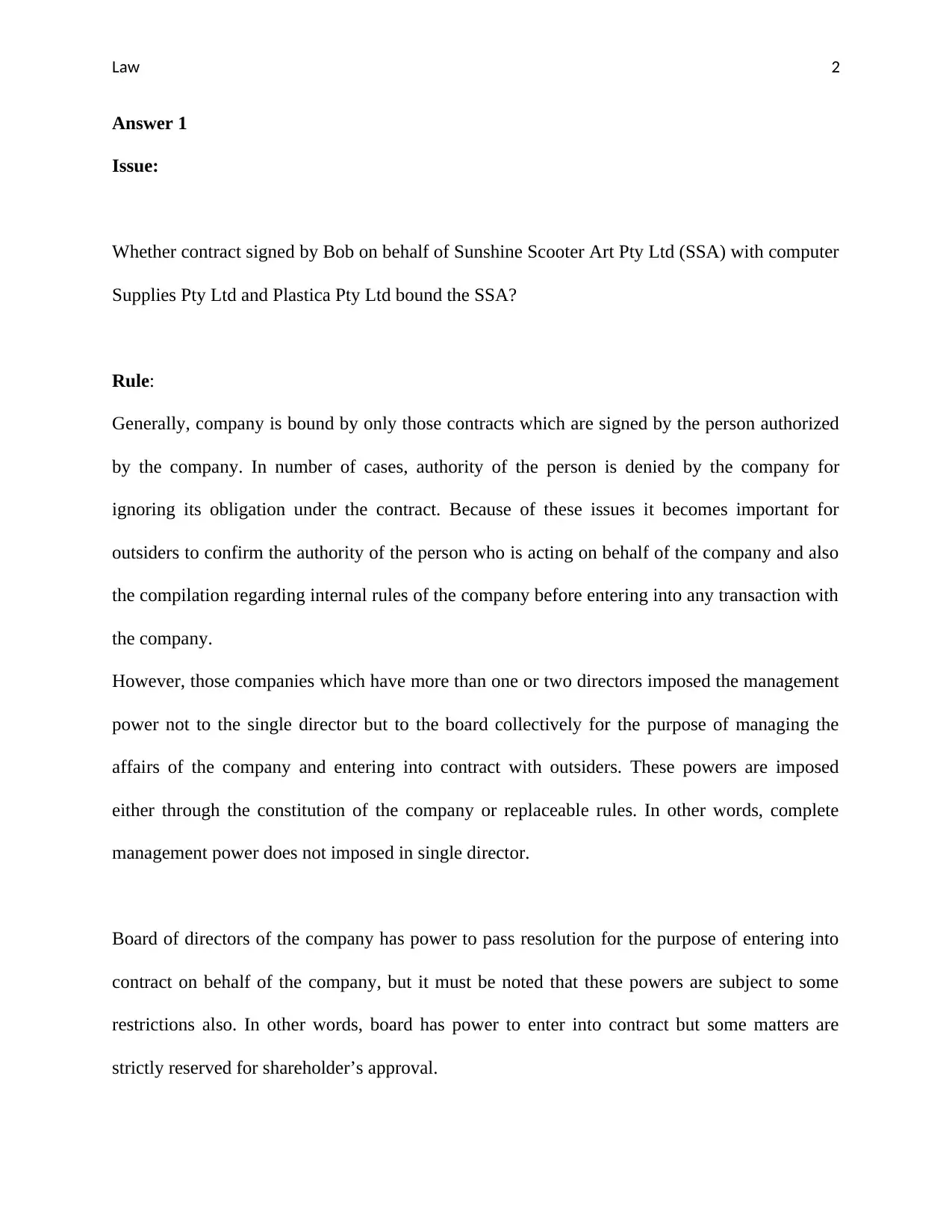
Law 2
Answer 1
Issue:
Whether contract signed by Bob on behalf of Sunshine Scooter Art Pty Ltd (SSA) with computer
Supplies Pty Ltd and Plastica Pty Ltd bound the SSA?
Rule:
Generally, company is bound by only those contracts which are signed by the person authorized
by the company. In number of cases, authority of the person is denied by the company for
ignoring its obligation under the contract. Because of these issues it becomes important for
outsiders to confirm the authority of the person who is acting on behalf of the company and also
the compilation regarding internal rules of the company before entering into any transaction with
the company.
However, those companies which have more than one or two directors imposed the management
power not to the single director but to the board collectively for the purpose of managing the
affairs of the company and entering into contract with outsiders. These powers are imposed
either through the constitution of the company or replaceable rules. In other words, complete
management power does not imposed in single director.
Board of directors of the company has power to pass resolution for the purpose of entering into
contract on behalf of the company, but it must be noted that these powers are subject to some
restrictions also. In other words, board has power to enter into contract but some matters are
strictly reserved for shareholder’s approval.
Answer 1
Issue:
Whether contract signed by Bob on behalf of Sunshine Scooter Art Pty Ltd (SSA) with computer
Supplies Pty Ltd and Plastica Pty Ltd bound the SSA?
Rule:
Generally, company is bound by only those contracts which are signed by the person authorized
by the company. In number of cases, authority of the person is denied by the company for
ignoring its obligation under the contract. Because of these issues it becomes important for
outsiders to confirm the authority of the person who is acting on behalf of the company and also
the compilation regarding internal rules of the company before entering into any transaction with
the company.
However, those companies which have more than one or two directors imposed the management
power not to the single director but to the board collectively for the purpose of managing the
affairs of the company and entering into contract with outsiders. These powers are imposed
either through the constitution of the company or replaceable rules. In other words, complete
management power does not imposed in single director.
Board of directors of the company has power to pass resolution for the purpose of entering into
contract on behalf of the company, but it must be noted that these powers are subject to some
restrictions also. In other words, board has power to enter into contract but some matters are
strictly reserved for shareholder’s approval.
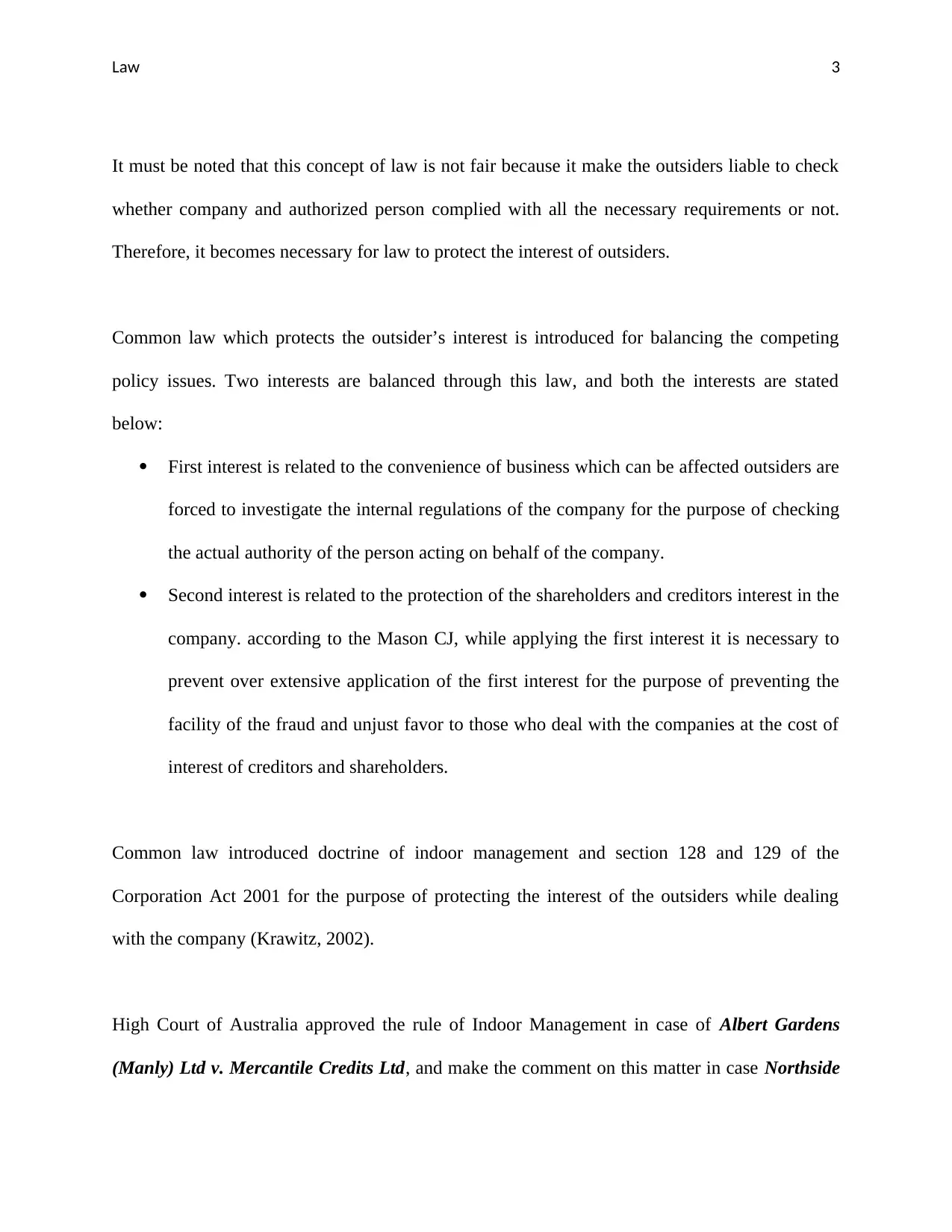
Law 3
It must be noted that this concept of law is not fair because it make the outsiders liable to check
whether company and authorized person complied with all the necessary requirements or not.
Therefore, it becomes necessary for law to protect the interest of outsiders.
Common law which protects the outsider’s interest is introduced for balancing the competing
policy issues. Two interests are balanced through this law, and both the interests are stated
below:
First interest is related to the convenience of business which can be affected outsiders are
forced to investigate the internal regulations of the company for the purpose of checking
the actual authority of the person acting on behalf of the company.
Second interest is related to the protection of the shareholders and creditors interest in the
company. according to the Mason CJ, while applying the first interest it is necessary to
prevent over extensive application of the first interest for the purpose of preventing the
facility of the fraud and unjust favor to those who deal with the companies at the cost of
interest of creditors and shareholders.
Common law introduced doctrine of indoor management and section 128 and 129 of the
Corporation Act 2001 for the purpose of protecting the interest of the outsiders while dealing
with the company (Krawitz, 2002).
High Court of Australia approved the rule of Indoor Management in case of Albert Gardens
(Manly) Ltd v. Mercantile Credits Ltd, and make the comment on this matter in case Northside
It must be noted that this concept of law is not fair because it make the outsiders liable to check
whether company and authorized person complied with all the necessary requirements or not.
Therefore, it becomes necessary for law to protect the interest of outsiders.
Common law which protects the outsider’s interest is introduced for balancing the competing
policy issues. Two interests are balanced through this law, and both the interests are stated
below:
First interest is related to the convenience of business which can be affected outsiders are
forced to investigate the internal regulations of the company for the purpose of checking
the actual authority of the person acting on behalf of the company.
Second interest is related to the protection of the shareholders and creditors interest in the
company. according to the Mason CJ, while applying the first interest it is necessary to
prevent over extensive application of the first interest for the purpose of preventing the
facility of the fraud and unjust favor to those who deal with the companies at the cost of
interest of creditors and shareholders.
Common law introduced doctrine of indoor management and section 128 and 129 of the
Corporation Act 2001 for the purpose of protecting the interest of the outsiders while dealing
with the company (Krawitz, 2002).
High Court of Australia approved the rule of Indoor Management in case of Albert Gardens
(Manly) Ltd v. Mercantile Credits Ltd, and make the comment on this matter in case Northside
⊘ This is a preview!⊘
Do you want full access?
Subscribe today to unlock all pages.

Trusted by 1+ million students worldwide
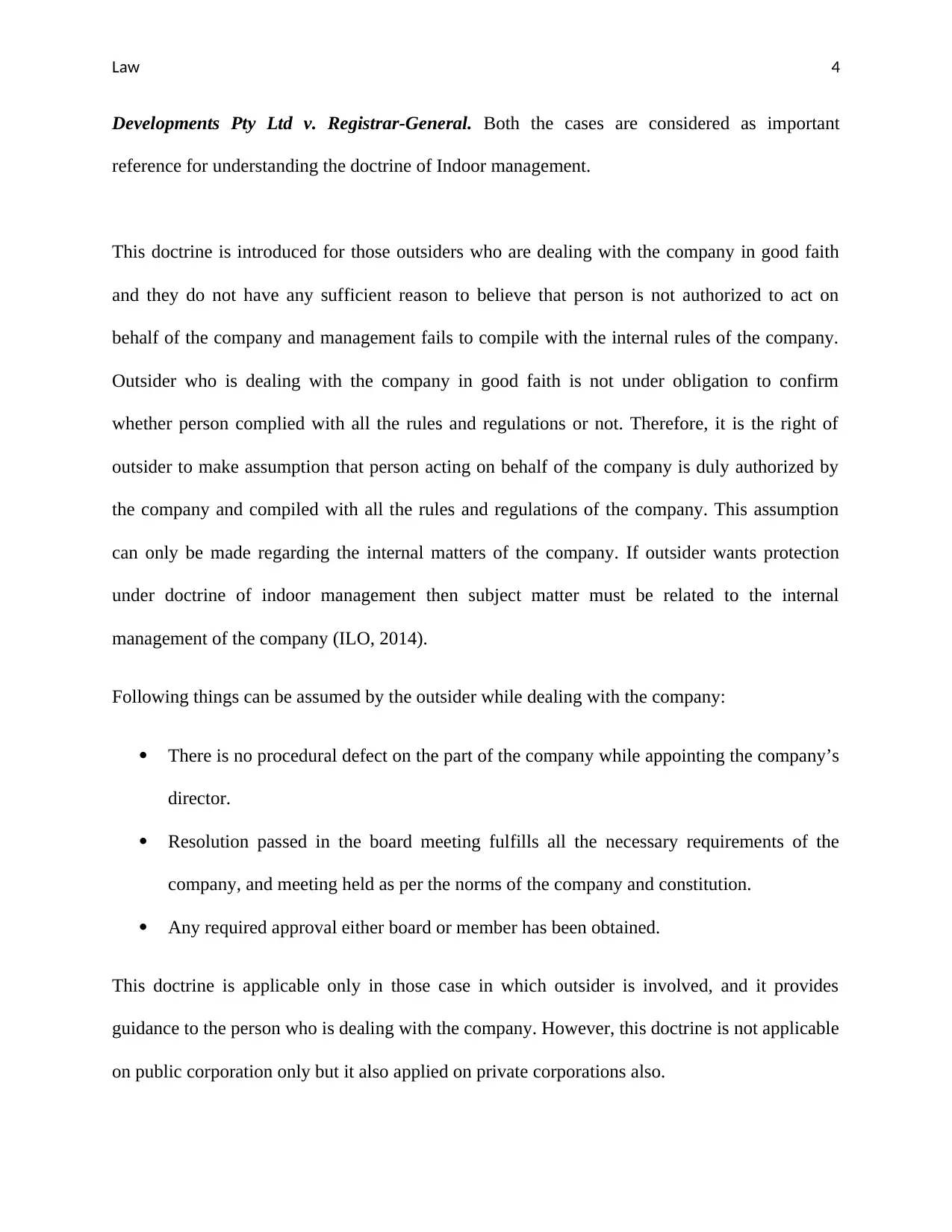
Law 4
Developments Pty Ltd v. Registrar-General. Both the cases are considered as important
reference for understanding the doctrine of Indoor management.
This doctrine is introduced for those outsiders who are dealing with the company in good faith
and they do not have any sufficient reason to believe that person is not authorized to act on
behalf of the company and management fails to compile with the internal rules of the company.
Outsider who is dealing with the company in good faith is not under obligation to confirm
whether person complied with all the rules and regulations or not. Therefore, it is the right of
outsider to make assumption that person acting on behalf of the company is duly authorized by
the company and compiled with all the rules and regulations of the company. This assumption
can only be made regarding the internal matters of the company. If outsider wants protection
under doctrine of indoor management then subject matter must be related to the internal
management of the company (ILO, 2014).
Following things can be assumed by the outsider while dealing with the company:
There is no procedural defect on the part of the company while appointing the company’s
director.
Resolution passed in the board meeting fulfills all the necessary requirements of the
company, and meeting held as per the norms of the company and constitution.
Any required approval either board or member has been obtained.
This doctrine is applicable only in those case in which outsider is involved, and it provides
guidance to the person who is dealing with the company. However, this doctrine is not applicable
on public corporation only but it also applied on private corporations also.
Developments Pty Ltd v. Registrar-General. Both the cases are considered as important
reference for understanding the doctrine of Indoor management.
This doctrine is introduced for those outsiders who are dealing with the company in good faith
and they do not have any sufficient reason to believe that person is not authorized to act on
behalf of the company and management fails to compile with the internal rules of the company.
Outsider who is dealing with the company in good faith is not under obligation to confirm
whether person complied with all the rules and regulations or not. Therefore, it is the right of
outsider to make assumption that person acting on behalf of the company is duly authorized by
the company and compiled with all the rules and regulations of the company. This assumption
can only be made regarding the internal matters of the company. If outsider wants protection
under doctrine of indoor management then subject matter must be related to the internal
management of the company (ILO, 2014).
Following things can be assumed by the outsider while dealing with the company:
There is no procedural defect on the part of the company while appointing the company’s
director.
Resolution passed in the board meeting fulfills all the necessary requirements of the
company, and meeting held as per the norms of the company and constitution.
Any required approval either board or member has been obtained.
This doctrine is applicable only in those case in which outsider is involved, and it provides
guidance to the person who is dealing with the company. However, this doctrine is not applicable
on public corporation only but it also applied on private corporations also.
Paraphrase This Document
Need a fresh take? Get an instant paraphrase of this document with our AI Paraphraser
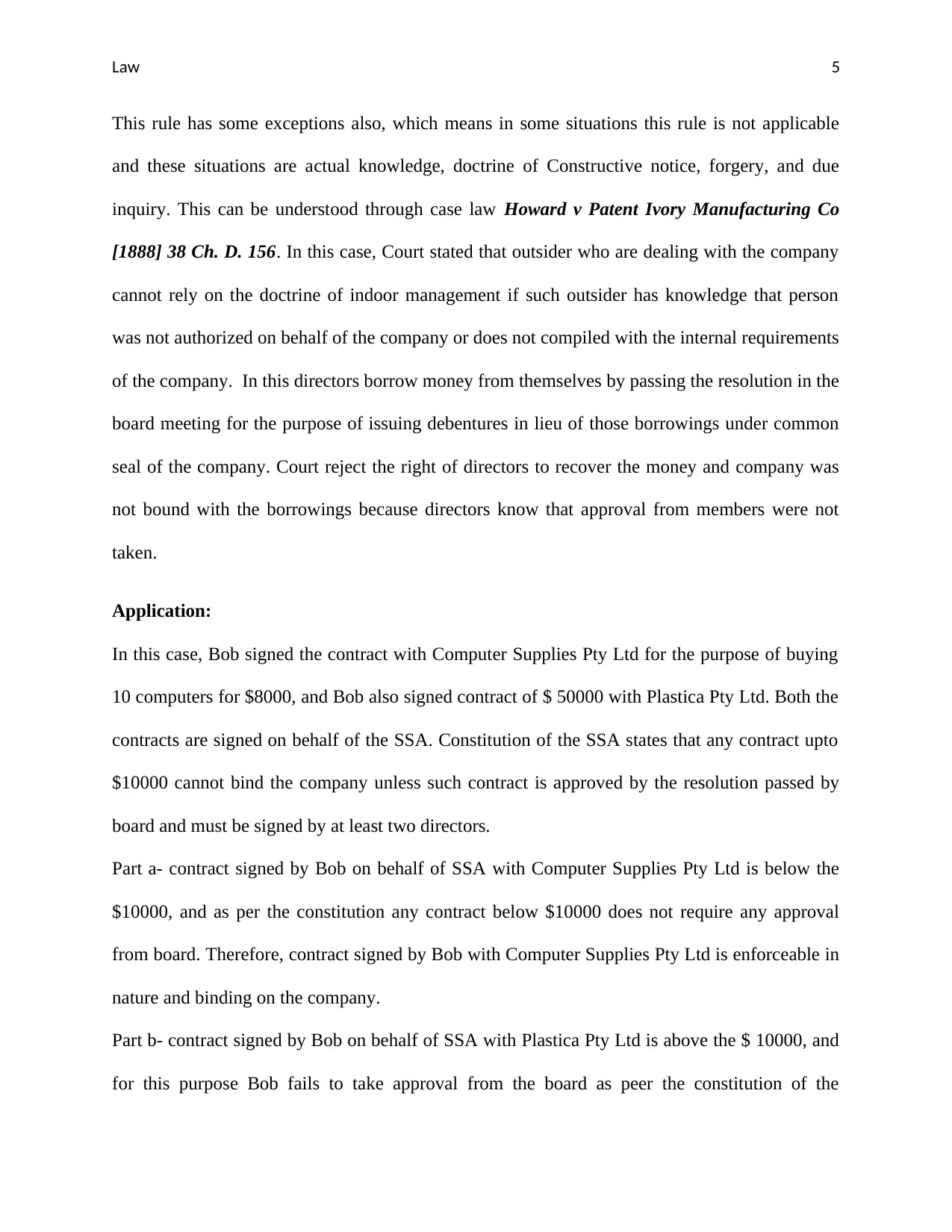
Law 5
This rule has some exceptions also, which means in some situations this rule is not applicable
and these situations are actual knowledge, doctrine of Constructive notice, forgery, and due
inquiry. This can be understood through case law Howard v Patent Ivory Manufacturing Co
[1888] 38 Ch. D. 156. In this case, Court stated that outsider who are dealing with the company
cannot rely on the doctrine of indoor management if such outsider has knowledge that person
was not authorized on behalf of the company or does not compiled with the internal requirements
of the company. In this directors borrow money from themselves by passing the resolution in the
board meeting for the purpose of issuing debentures in lieu of those borrowings under common
seal of the company. Court reject the right of directors to recover the money and company was
not bound with the borrowings because directors know that approval from members were not
taken.
Application:
In this case, Bob signed the contract with Computer Supplies Pty Ltd for the purpose of buying
10 computers for $8000, and Bob also signed contract of $ 50000 with Plastica Pty Ltd. Both the
contracts are signed on behalf of the SSA. Constitution of the SSA states that any contract upto
$10000 cannot bind the company unless such contract is approved by the resolution passed by
board and must be signed by at least two directors.
Part a- contract signed by Bob on behalf of SSA with Computer Supplies Pty Ltd is below the
$10000, and as per the constitution any contract below $10000 does not require any approval
from board. Therefore, contract signed by Bob with Computer Supplies Pty Ltd is enforceable in
nature and binding on the company.
Part b- contract signed by Bob on behalf of SSA with Plastica Pty Ltd is above the $ 10000, and
for this purpose Bob fails to take approval from the board as peer the constitution of the
This rule has some exceptions also, which means in some situations this rule is not applicable
and these situations are actual knowledge, doctrine of Constructive notice, forgery, and due
inquiry. This can be understood through case law Howard v Patent Ivory Manufacturing Co
[1888] 38 Ch. D. 156. In this case, Court stated that outsider who are dealing with the company
cannot rely on the doctrine of indoor management if such outsider has knowledge that person
was not authorized on behalf of the company or does not compiled with the internal requirements
of the company. In this directors borrow money from themselves by passing the resolution in the
board meeting for the purpose of issuing debentures in lieu of those borrowings under common
seal of the company. Court reject the right of directors to recover the money and company was
not bound with the borrowings because directors know that approval from members were not
taken.
Application:
In this case, Bob signed the contract with Computer Supplies Pty Ltd for the purpose of buying
10 computers for $8000, and Bob also signed contract of $ 50000 with Plastica Pty Ltd. Both the
contracts are signed on behalf of the SSA. Constitution of the SSA states that any contract upto
$10000 cannot bind the company unless such contract is approved by the resolution passed by
board and must be signed by at least two directors.
Part a- contract signed by Bob on behalf of SSA with Computer Supplies Pty Ltd is below the
$10000, and as per the constitution any contract below $10000 does not require any approval
from board. Therefore, contract signed by Bob with Computer Supplies Pty Ltd is enforceable in
nature and binding on the company.
Part b- contract signed by Bob on behalf of SSA with Plastica Pty Ltd is above the $ 10000, and
for this purpose Bob fails to take approval from the board as peer the constitution of the
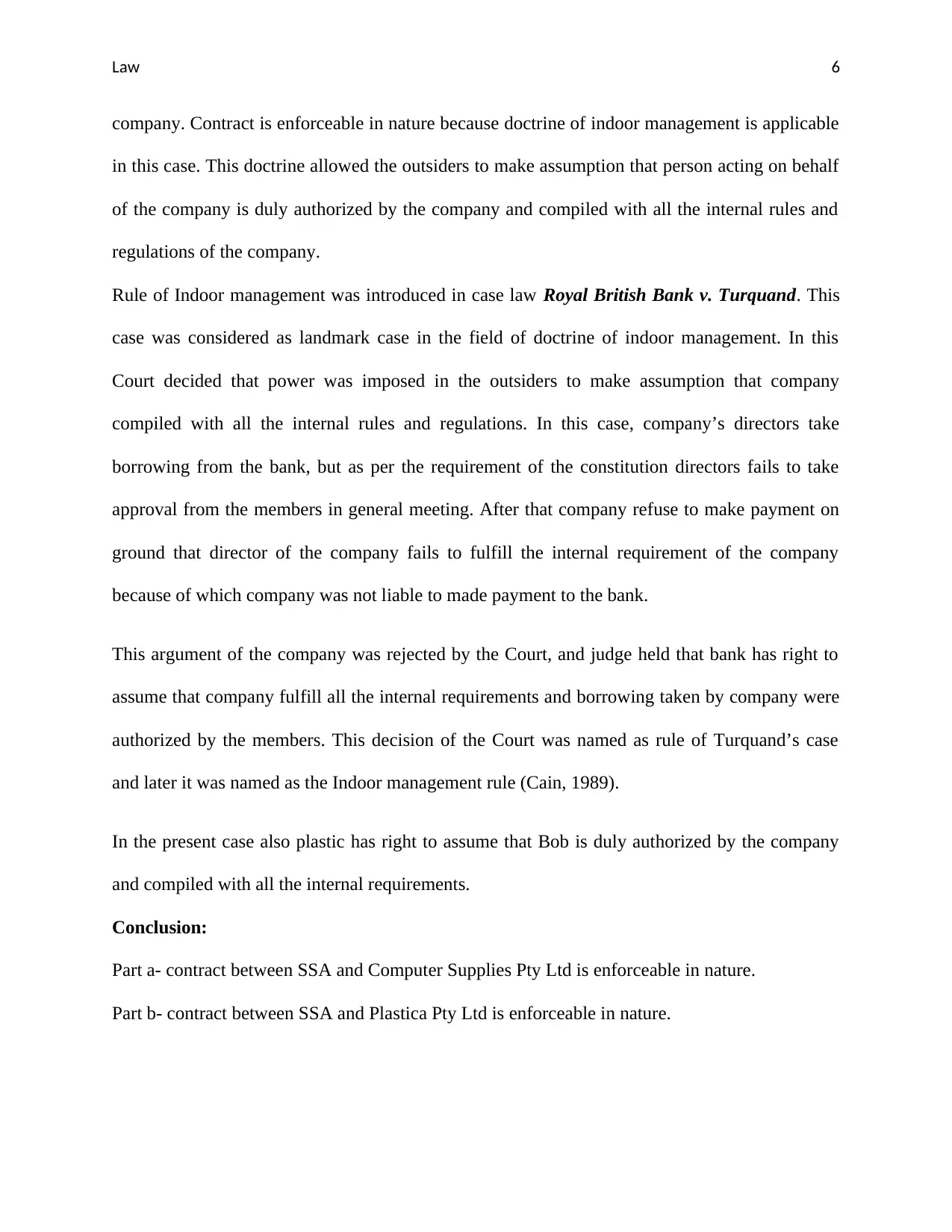
Law 6
company. Contract is enforceable in nature because doctrine of indoor management is applicable
in this case. This doctrine allowed the outsiders to make assumption that person acting on behalf
of the company is duly authorized by the company and compiled with all the internal rules and
regulations of the company.
Rule of Indoor management was introduced in case law Royal British Bank v. Turquand. This
case was considered as landmark case in the field of doctrine of indoor management. In this
Court decided that power was imposed in the outsiders to make assumption that company
compiled with all the internal rules and regulations. In this case, company’s directors take
borrowing from the bank, but as per the requirement of the constitution directors fails to take
approval from the members in general meeting. After that company refuse to make payment on
ground that director of the company fails to fulfill the internal requirement of the company
because of which company was not liable to made payment to the bank.
This argument of the company was rejected by the Court, and judge held that bank has right to
assume that company fulfill all the internal requirements and borrowing taken by company were
authorized by the members. This decision of the Court was named as rule of Turquand’s case
and later it was named as the Indoor management rule (Cain, 1989).
In the present case also plastic has right to assume that Bob is duly authorized by the company
and compiled with all the internal requirements.
Conclusion:
Part a- contract between SSA and Computer Supplies Pty Ltd is enforceable in nature.
Part b- contract between SSA and Plastica Pty Ltd is enforceable in nature.
company. Contract is enforceable in nature because doctrine of indoor management is applicable
in this case. This doctrine allowed the outsiders to make assumption that person acting on behalf
of the company is duly authorized by the company and compiled with all the internal rules and
regulations of the company.
Rule of Indoor management was introduced in case law Royal British Bank v. Turquand. This
case was considered as landmark case in the field of doctrine of indoor management. In this
Court decided that power was imposed in the outsiders to make assumption that company
compiled with all the internal rules and regulations. In this case, company’s directors take
borrowing from the bank, but as per the requirement of the constitution directors fails to take
approval from the members in general meeting. After that company refuse to make payment on
ground that director of the company fails to fulfill the internal requirement of the company
because of which company was not liable to made payment to the bank.
This argument of the company was rejected by the Court, and judge held that bank has right to
assume that company fulfill all the internal requirements and borrowing taken by company were
authorized by the members. This decision of the Court was named as rule of Turquand’s case
and later it was named as the Indoor management rule (Cain, 1989).
In the present case also plastic has right to assume that Bob is duly authorized by the company
and compiled with all the internal requirements.
Conclusion:
Part a- contract between SSA and Computer Supplies Pty Ltd is enforceable in nature.
Part b- contract between SSA and Plastica Pty Ltd is enforceable in nature.
⊘ This is a preview!⊘
Do you want full access?
Subscribe today to unlock all pages.

Trusted by 1+ million students worldwide
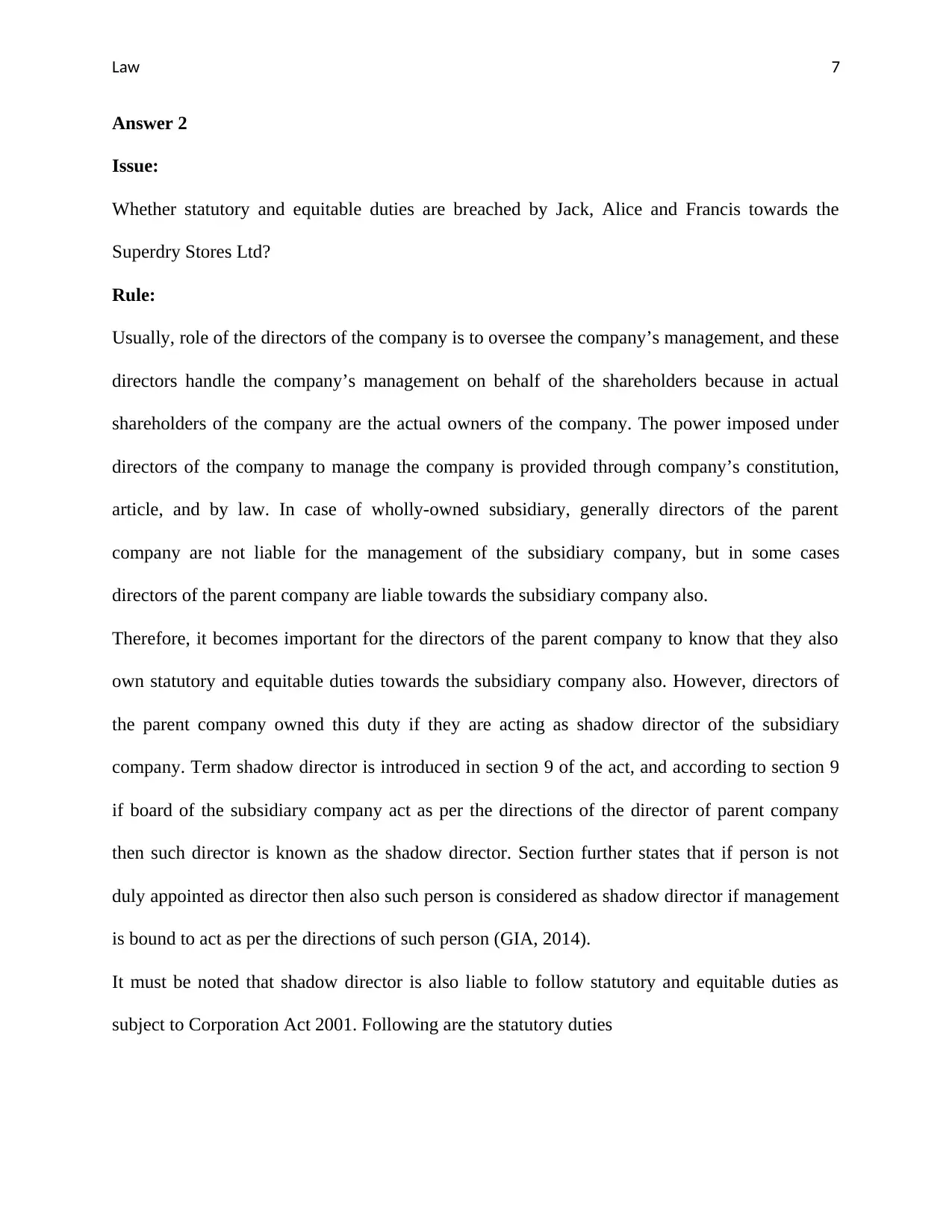
Law 7
Answer 2
Issue:
Whether statutory and equitable duties are breached by Jack, Alice and Francis towards the
Superdry Stores Ltd?
Rule:
Usually, role of the directors of the company is to oversee the company’s management, and these
directors handle the company’s management on behalf of the shareholders because in actual
shareholders of the company are the actual owners of the company. The power imposed under
directors of the company to manage the company is provided through company’s constitution,
article, and by law. In case of wholly-owned subsidiary, generally directors of the parent
company are not liable for the management of the subsidiary company, but in some cases
directors of the parent company are liable towards the subsidiary company also.
Therefore, it becomes important for the directors of the parent company to know that they also
own statutory and equitable duties towards the subsidiary company also. However, directors of
the parent company owned this duty if they are acting as shadow director of the subsidiary
company. Term shadow director is introduced in section 9 of the act, and according to section 9
if board of the subsidiary company act as per the directions of the director of parent company
then such director is known as the shadow director. Section further states that if person is not
duly appointed as director then also such person is considered as shadow director if management
is bound to act as per the directions of such person (GIA, 2014).
It must be noted that shadow director is also liable to follow statutory and equitable duties as
subject to Corporation Act 2001. Following are the statutory duties
Answer 2
Issue:
Whether statutory and equitable duties are breached by Jack, Alice and Francis towards the
Superdry Stores Ltd?
Rule:
Usually, role of the directors of the company is to oversee the company’s management, and these
directors handle the company’s management on behalf of the shareholders because in actual
shareholders of the company are the actual owners of the company. The power imposed under
directors of the company to manage the company is provided through company’s constitution,
article, and by law. In case of wholly-owned subsidiary, generally directors of the parent
company are not liable for the management of the subsidiary company, but in some cases
directors of the parent company are liable towards the subsidiary company also.
Therefore, it becomes important for the directors of the parent company to know that they also
own statutory and equitable duties towards the subsidiary company also. However, directors of
the parent company owned this duty if they are acting as shadow director of the subsidiary
company. Term shadow director is introduced in section 9 of the act, and according to section 9
if board of the subsidiary company act as per the directions of the director of parent company
then such director is known as the shadow director. Section further states that if person is not
duly appointed as director then also such person is considered as shadow director if management
is bound to act as per the directions of such person (GIA, 2014).
It must be noted that shadow director is also liable to follow statutory and equitable duties as
subject to Corporation Act 2001. Following are the statutory duties
Paraphrase This Document
Need a fresh take? Get an instant paraphrase of this document with our AI Paraphraser
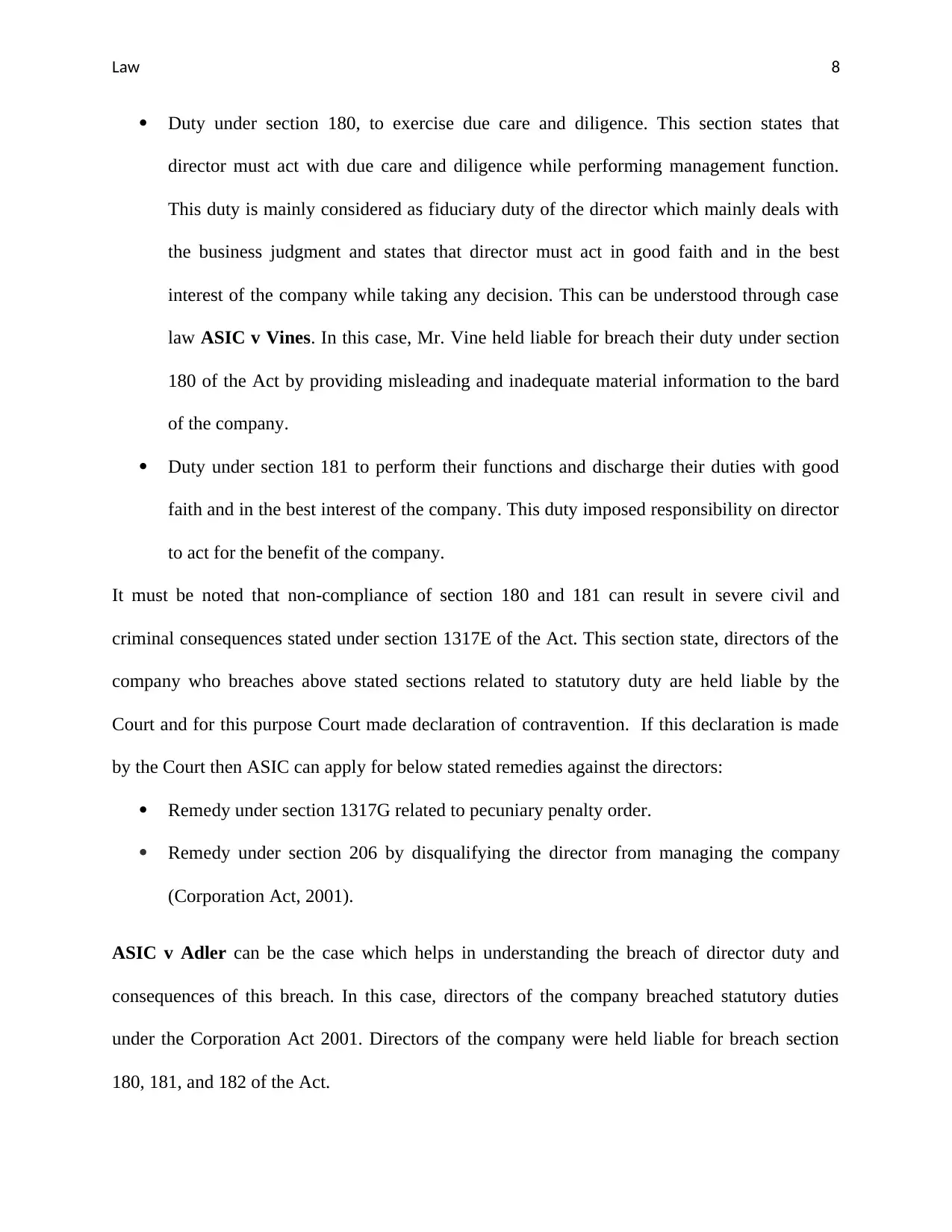
Law 8
Duty under section 180, to exercise due care and diligence. This section states that
director must act with due care and diligence while performing management function.
This duty is mainly considered as fiduciary duty of the director which mainly deals with
the business judgment and states that director must act in good faith and in the best
interest of the company while taking any decision. This can be understood through case
law ASIC v Vines. In this case, Mr. Vine held liable for breach their duty under section
180 of the Act by providing misleading and inadequate material information to the bard
of the company.
Duty under section 181 to perform their functions and discharge their duties with good
faith and in the best interest of the company. This duty imposed responsibility on director
to act for the benefit of the company.
It must be noted that non-compliance of section 180 and 181 can result in severe civil and
criminal consequences stated under section 1317E of the Act. This section state, directors of the
company who breaches above stated sections related to statutory duty are held liable by the
Court and for this purpose Court made declaration of contravention. If this declaration is made
by the Court then ASIC can apply for below stated remedies against the directors:
Remedy under section 1317G related to pecuniary penalty order.
Remedy under section 206 by disqualifying the director from managing the company
(Corporation Act, 2001).
ASIC v Adler can be the case which helps in understanding the breach of director duty and
consequences of this breach. In this case, directors of the company breached statutory duties
under the Corporation Act 2001. Directors of the company were held liable for breach section
180, 181, and 182 of the Act.
Duty under section 180, to exercise due care and diligence. This section states that
director must act with due care and diligence while performing management function.
This duty is mainly considered as fiduciary duty of the director which mainly deals with
the business judgment and states that director must act in good faith and in the best
interest of the company while taking any decision. This can be understood through case
law ASIC v Vines. In this case, Mr. Vine held liable for breach their duty under section
180 of the Act by providing misleading and inadequate material information to the bard
of the company.
Duty under section 181 to perform their functions and discharge their duties with good
faith and in the best interest of the company. This duty imposed responsibility on director
to act for the benefit of the company.
It must be noted that non-compliance of section 180 and 181 can result in severe civil and
criminal consequences stated under section 1317E of the Act. This section state, directors of the
company who breaches above stated sections related to statutory duty are held liable by the
Court and for this purpose Court made declaration of contravention. If this declaration is made
by the Court then ASIC can apply for below stated remedies against the directors:
Remedy under section 1317G related to pecuniary penalty order.
Remedy under section 206 by disqualifying the director from managing the company
(Corporation Act, 2001).
ASIC v Adler can be the case which helps in understanding the breach of director duty and
consequences of this breach. In this case, directors of the company breached statutory duties
under the Corporation Act 2001. Directors of the company were held liable for breach section
180, 181, and 182 of the Act.
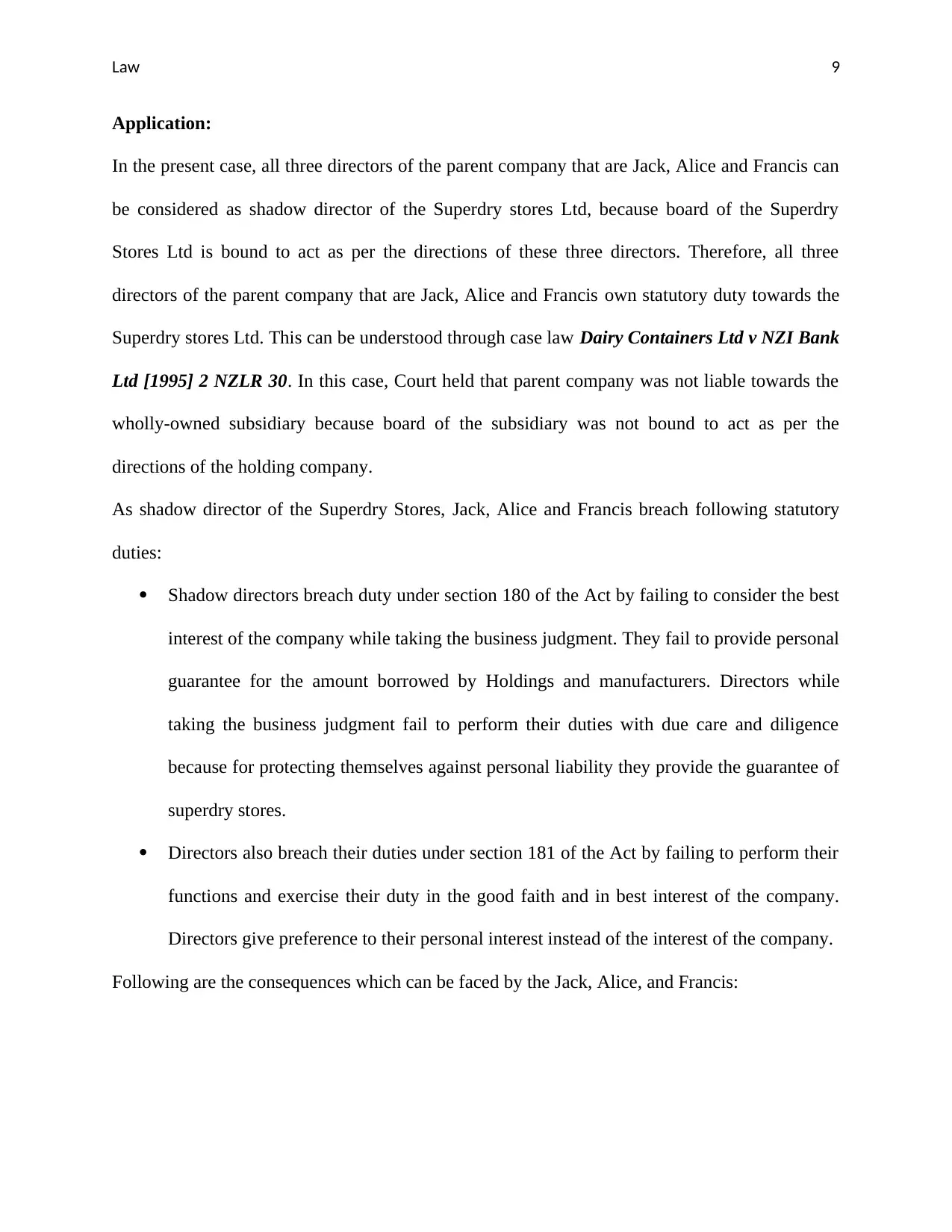
Law 9
Application:
In the present case, all three directors of the parent company that are Jack, Alice and Francis can
be considered as shadow director of the Superdry stores Ltd, because board of the Superdry
Stores Ltd is bound to act as per the directions of these three directors. Therefore, all three
directors of the parent company that are Jack, Alice and Francis own statutory duty towards the
Superdry stores Ltd. This can be understood through case law Dairy Containers Ltd v NZI Bank
Ltd [1995] 2 NZLR 30. In this case, Court held that parent company was not liable towards the
wholly-owned subsidiary because board of the subsidiary was not bound to act as per the
directions of the holding company.
As shadow director of the Superdry Stores, Jack, Alice and Francis breach following statutory
duties:
Shadow directors breach duty under section 180 of the Act by failing to consider the best
interest of the company while taking the business judgment. They fail to provide personal
guarantee for the amount borrowed by Holdings and manufacturers. Directors while
taking the business judgment fail to perform their duties with due care and diligence
because for protecting themselves against personal liability they provide the guarantee of
superdry stores.
Directors also breach their duties under section 181 of the Act by failing to perform their
functions and exercise their duty in the good faith and in best interest of the company.
Directors give preference to their personal interest instead of the interest of the company.
Following are the consequences which can be faced by the Jack, Alice, and Francis:
Application:
In the present case, all three directors of the parent company that are Jack, Alice and Francis can
be considered as shadow director of the Superdry stores Ltd, because board of the Superdry
Stores Ltd is bound to act as per the directions of these three directors. Therefore, all three
directors of the parent company that are Jack, Alice and Francis own statutory duty towards the
Superdry stores Ltd. This can be understood through case law Dairy Containers Ltd v NZI Bank
Ltd [1995] 2 NZLR 30. In this case, Court held that parent company was not liable towards the
wholly-owned subsidiary because board of the subsidiary was not bound to act as per the
directions of the holding company.
As shadow director of the Superdry Stores, Jack, Alice and Francis breach following statutory
duties:
Shadow directors breach duty under section 180 of the Act by failing to consider the best
interest of the company while taking the business judgment. They fail to provide personal
guarantee for the amount borrowed by Holdings and manufacturers. Directors while
taking the business judgment fail to perform their duties with due care and diligence
because for protecting themselves against personal liability they provide the guarantee of
superdry stores.
Directors also breach their duties under section 181 of the Act by failing to perform their
functions and exercise their duty in the good faith and in best interest of the company.
Directors give preference to their personal interest instead of the interest of the company.
Following are the consequences which can be faced by the Jack, Alice, and Francis:
⊘ This is a preview!⊘
Do you want full access?
Subscribe today to unlock all pages.

Trusted by 1+ million students worldwide
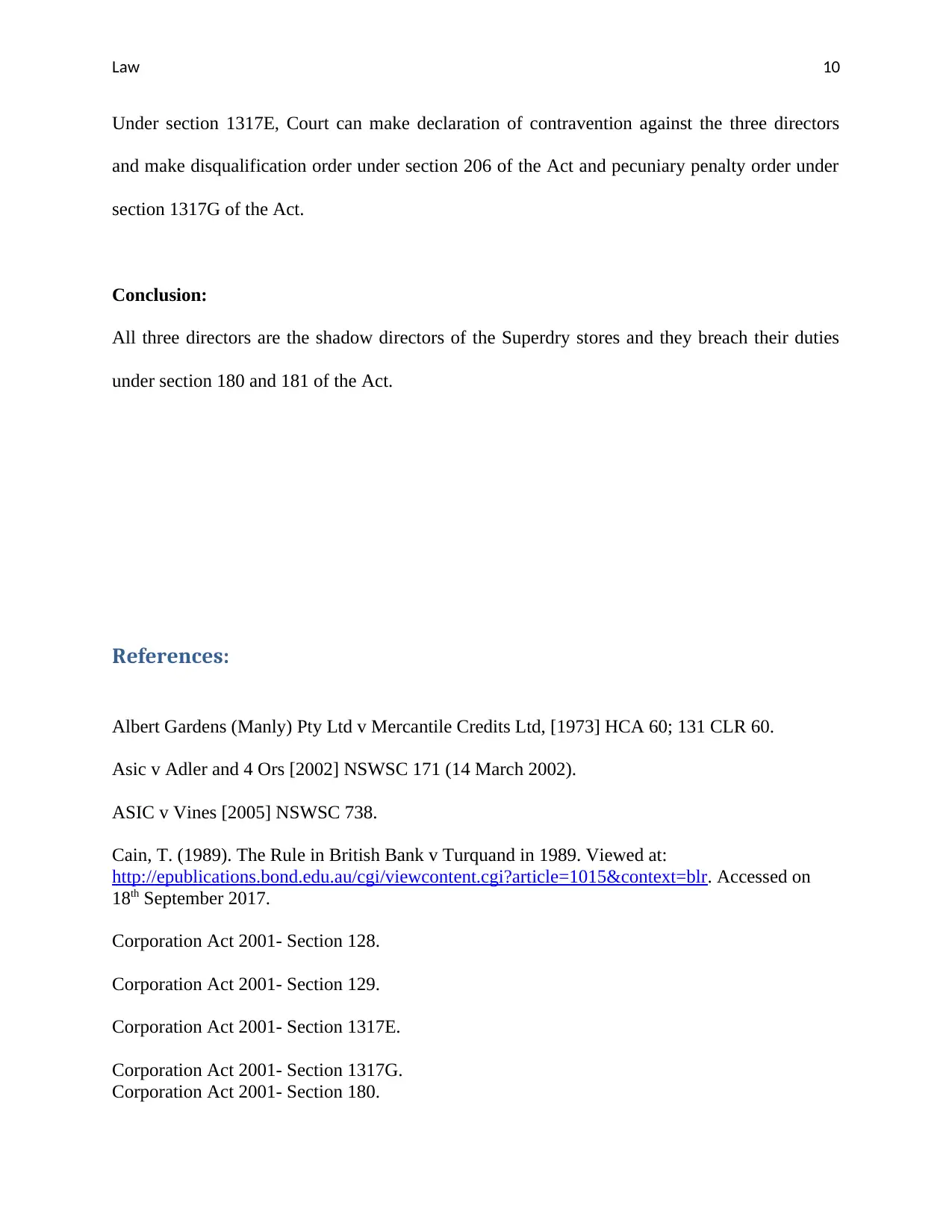
Law 10
Under section 1317E, Court can make declaration of contravention against the three directors
and make disqualification order under section 206 of the Act and pecuniary penalty order under
section 1317G of the Act.
Conclusion:
All three directors are the shadow directors of the Superdry stores and they breach their duties
under section 180 and 181 of the Act.
References:
Albert Gardens (Manly) Pty Ltd v Mercantile Credits Ltd, [1973] HCA 60; 131 CLR 60.
Asic v Adler and 4 Ors [2002] NSWSC 171 (14 March 2002).
ASIC v Vines [2005] NSWSC 738.
Cain, T. (1989). The Rule in British Bank v Turquand in 1989. Viewed at:
http://epublications.bond.edu.au/cgi/viewcontent.cgi?article=1015&context=blr. Accessed on
18th September 2017.
Corporation Act 2001- Section 128.
Corporation Act 2001- Section 129.
Corporation Act 2001- Section 1317E.
Corporation Act 2001- Section 1317G.
Corporation Act 2001- Section 180.
Under section 1317E, Court can make declaration of contravention against the three directors
and make disqualification order under section 206 of the Act and pecuniary penalty order under
section 1317G of the Act.
Conclusion:
All three directors are the shadow directors of the Superdry stores and they breach their duties
under section 180 and 181 of the Act.
References:
Albert Gardens (Manly) Pty Ltd v Mercantile Credits Ltd, [1973] HCA 60; 131 CLR 60.
Asic v Adler and 4 Ors [2002] NSWSC 171 (14 March 2002).
ASIC v Vines [2005] NSWSC 738.
Cain, T. (1989). The Rule in British Bank v Turquand in 1989. Viewed at:
http://epublications.bond.edu.au/cgi/viewcontent.cgi?article=1015&context=blr. Accessed on
18th September 2017.
Corporation Act 2001- Section 128.
Corporation Act 2001- Section 129.
Corporation Act 2001- Section 1317E.
Corporation Act 2001- Section 1317G.
Corporation Act 2001- Section 180.
Paraphrase This Document
Need a fresh take? Get an instant paraphrase of this document with our AI Paraphraser
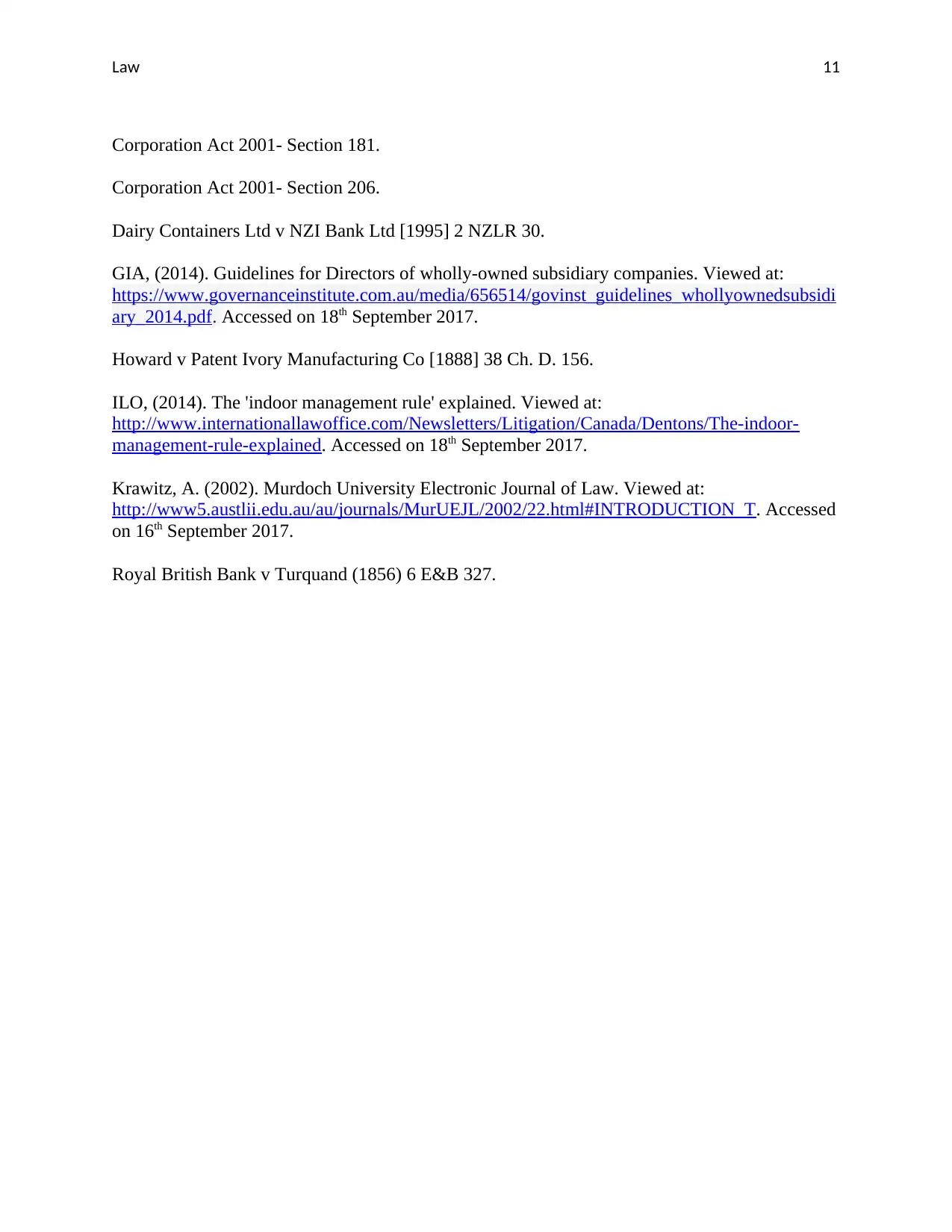
Law 11
Corporation Act 2001- Section 181.
Corporation Act 2001- Section 206.
Dairy Containers Ltd v NZI Bank Ltd [1995] 2 NZLR 30.
GIA, (2014). Guidelines for Directors of wholly-owned subsidiary companies. Viewed at:
https://www.governanceinstitute.com.au/media/656514/govinst_guidelines_whollyownedsubsidi
ary_2014.pdf. Accessed on 18th September 2017.
Howard v Patent Ivory Manufacturing Co [1888] 38 Ch. D. 156.
ILO, (2014). The 'indoor management rule' explained. Viewed at:
http://www.internationallawoffice.com/Newsletters/Litigation/Canada/Dentons/The-indoor-
management-rule-explained. Accessed on 18th September 2017.
Krawitz, A. (2002). Murdoch University Electronic Journal of Law. Viewed at:
http://www5.austlii.edu.au/au/journals/MurUEJL/2002/22.html#INTRODUCTION_T. Accessed
on 16th September 2017.
Royal British Bank v Turquand (1856) 6 E&B 327.
Corporation Act 2001- Section 181.
Corporation Act 2001- Section 206.
Dairy Containers Ltd v NZI Bank Ltd [1995] 2 NZLR 30.
GIA, (2014). Guidelines for Directors of wholly-owned subsidiary companies. Viewed at:
https://www.governanceinstitute.com.au/media/656514/govinst_guidelines_whollyownedsubsidi
ary_2014.pdf. Accessed on 18th September 2017.
Howard v Patent Ivory Manufacturing Co [1888] 38 Ch. D. 156.
ILO, (2014). The 'indoor management rule' explained. Viewed at:
http://www.internationallawoffice.com/Newsletters/Litigation/Canada/Dentons/The-indoor-
management-rule-explained. Accessed on 18th September 2017.
Krawitz, A. (2002). Murdoch University Electronic Journal of Law. Viewed at:
http://www5.austlii.edu.au/au/journals/MurUEJL/2002/22.html#INTRODUCTION_T. Accessed
on 16th September 2017.
Royal British Bank v Turquand (1856) 6 E&B 327.
1 out of 11
Related Documents
Your All-in-One AI-Powered Toolkit for Academic Success.
+13062052269
info@desklib.com
Available 24*7 on WhatsApp / Email
![[object Object]](/_next/static/media/star-bottom.7253800d.svg)
Unlock your academic potential
Copyright © 2020–2026 A2Z Services. All Rights Reserved. Developed and managed by ZUCOL.





